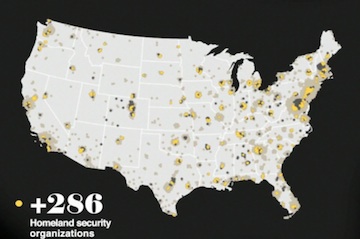
Click on to search for FBI and police offices by city of zip code

Click on to search for FBI and police offices by city of zip code
|
FBI assembling a database on Americans, according to report
If you ask me it sounds like your classic jobs program for cops. The Feds offer money to the local cops to catch terrorists and the local cops will dream up anything they can to get a cut of the money. Of course once they have the loot they could care less if the catch any criminals or terrorists. The only thing the cops are interested in at this point in time is getting more loot from Uncle Sam! 5 revelations from the Post’s ‘Monitoring America’ investigation By Liz Goodwin liz Goodwin – Mon Dec 20, 10:05 am ET The FBI is assembling a massive database on thousands of Americans, many of whom have not been accused of any crime, the Washington Post's Dana Priest and William Arkin report. The reporters' latest look at the country's ballooning national security system focuses on the role that local agencies -- often staffed by people with little to no counter-terrorism training -- have played in combating terrorism since 2001. Here are five striking revelations in their piece: 1. The FBI's Nationwide Suspicious Activity Reporting Initiative, or SAR, currently contains 161,948 suspicious activity files, into which authorities can put information they've gathered about the people at the center of the files: employment history, financial documents, phone numbers, photos. In many cases, the people in the files have not been accused of any crime but have attracted the suspicions of a local cop, FBI agent or even fellow citizen. The files have led to five arrests but no convictions, the FBI says. Some of the files are unclassified so that local police agencies and even businesses can submit reports on anyone they deem suspicious. 2. The Department of Homeland Security does not know how much it spends in funding state fusion centers, which synthesize security information from all state agencies and feed information to SAR. But since 2001, the department has doled out $31 billion to states and localities for domestic security initiatives. 3. Local officials at these fusion centers are tasked with understanding terrorism, but have little or no training. To fill the void, self-styled experts with fairly extreme views on the scope of the Muslim terrorist threat are asked to come in and train local authorities, the Post reports. Professed ex-terrorist Walid Shoebat told a group at the first annual South Dakota Fusion Center Conference in Sioux Falls this year that they should monitor local Muslim student groups and mosques and try to tap their phones. "You can find out a lot of information that way," he said. [Illegally of course! But I guess for a cop an illegal phone tap means nothing!] National intelligence officials told the Post they preferred that people with "evidence-based" approaches to Islam were lecturing instead, but that no guidelines are in place to determine the qualifications of a given speaker. 4. The localities are often left without guidance from the Department of Homeland Security, which can lead to confusion about the counter-terrorism actions they're supposed to be carrying out. Virginia's fusion center named historically black colleges as "potential" terrorism hubs; Maryland State Police infiltrated local groups that lobbied for bike lanes and human rights; and a contractor in Pennsylvania writing an intelligence bulletin flagged meetings of the Tea Party Patriots Coalition and environmental activists. 5. Many states and towns are taking the unprecedented amounts of money handed out to fight terrorists and are using it instead to fight crime. "We have our own terrorists, and they are taking lives every day," Memphis Police Director Larry Godwin said. |